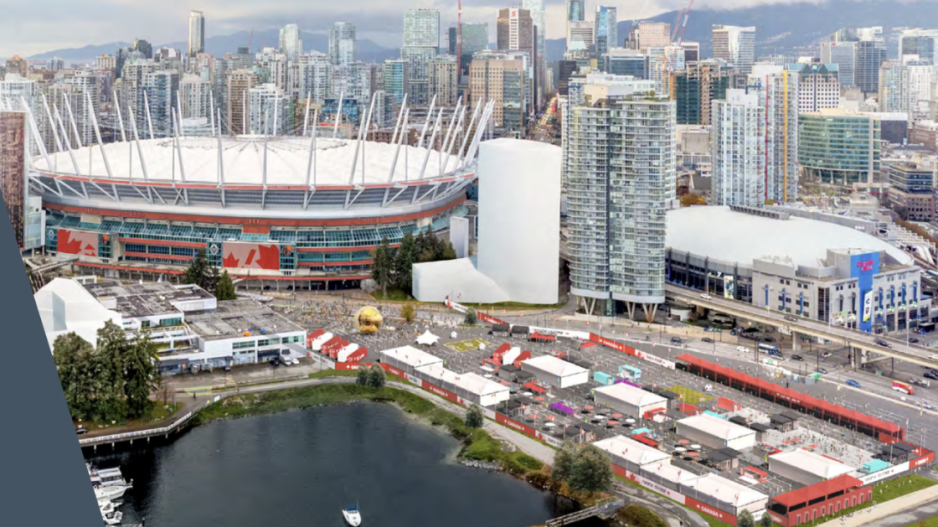The Pacific National Exhibition grounds were proposed as the site of Vancouver’s fan festival for the duration of the FIFA World Cup in 2026.
Vancouver Park Board pitches at Empire Fields, Jericho, Killarney and Strathcona were also designated official candidates for team training sites in June 2026, according to an internal email in February and March 2022 between managers at Vancouver city hall and senior bureaucrats with B.C.’s ministries of finance, and tourism, arts, culture and sport. The two chosen practice pitches will require a complete overhaul, including potential new field houses.
Email discussing security planning mentions three to four downtown Vancouver hotels will be required for team accommodations, and that FIFA also requires heavy security for arrivals and departures at Vancouver International Airport, both commercial and charter.
Those are among the scant details released because Vancouver city hall’s freedom of information office has withheld the entirety of its hosting proposal, host city contract, questionnaires and legal opinions submitted in March 2022 to FIFA. City hall cites an alleged fear of harming public body and third-party business interests under sections of the freedom of information law. An unnamed third party has complained to the Office of the Information and Privacy Commissioner about the city keeping secret almost 2,000 pages of records.
Email records that were obtained included plans for the three-day visit in February 2022 by FIFA’s chief tournaments and events officer Colin Smith, head of bidding Nicholas Rozenberg, vice-president Victor Montagliani and Peter Montopoli, the chief of Canadian operations for the 2026 tournament.
A month later, the so-called “Team B.C.” bid was filed with FIFA, more than two weeks ahead of deadline. Last June, organizers of the biggest World Cup in history announced BC Place Stadium as one of the 16 tournament venues in the U.S., Canada and Mexico.
Vancouver was originally expected to host five of the 80 matches, but that is likely to increase after FIFA’s mid-March announcement to expand the tournament to 104 games over 39 days.
The mostly censored disclosure file includes the cover of a presentation by Canadian Soccer Association contractor BaAM Productions that shows a Canada Soccer-branded fan zone on Concord Pacific land across from dressed-in-red BC Place, including a giant golden ball and seating for thousands of fans.
The zone extends across Pacific Boulevard, which will be closed each match day and the day preceding each match, according to the email. The plan assumes that Expo Boulevard will be closed for an unspecified period of time before, during and after the tournament for use as a broadcast compound. But the map of the entire security and transportation closure zone around the stadium was also censored in full.
Meetings early last year involved personnel from the Vancouver Police Department, Vancouver Fire and Rescue Service, B.C. Emergency Health Service, Emergency Management B.C., TransLink, Transit Police, City of Vancouver emergency planning and special events, YVR security and the RCMP.
A Feb. 23, 2022 safety and security planning email from the assistant manager of city hall’s sport hosting office, Taunya Geelhoed, said the majority of risk in hosting the World Cup is based on security needs.
Deputy city manager Karen Levitt’s confidential March 1, 2022 memo said that all Canadian parties involved were working toward a multi-party agreement to spell out each other’s roles and responsibilities.
But costs were the great unknown. In many ways, they continue to be.
Michelle Collens, manager of Sport Hosting Vancouver, provided preliminary estimates to Levitt and city manager Paul Mochrie on Feb. 11, 2022. Those are also censored in full.
“Even though we have entered these discussions late, it’s clear from Sport Canada that we will all be treated equally and no host city has negotiated something that one will get but not others,” Collens wrote.
“We have done a costing exercise for what we know we may have to do (what’s in agreements). We have not done an estimate of what we ‘don’t know’ – and would need some clarity on how we approach this.”
Vancouver was not included in the winning three-country bid in 2018 after then-premier John Horgan balked at giving FIFA a blank cheque and bidders refused to negotiate more favourable terms to B.C. Horgan changed his mind in 2021 when Montreal withdrew due to its concern over high costs.
Vancouver city hall kept cost estimates secret through last year’s civic election.
After Toronto city hall estimated it would cost $290 million for matches there, the B.C. government announced last June that B.C. taxpayers could expect a bill of $240 million to $260 million to subsidize hosting the tournament. But, in January, the province said the city is now responsible for $230 million and gave it special authority to recoup the costs by charging a 2.5-per-cent tax on accommodations until 2030.
The province has not elaborated on cost estimates for BC Place, such as installation of a temporary natural grass pitch and interior renovations to transform part of the B.C. Sports Hall of Fame into additional luxury suites.
FIFA reported record gross revenue of US$7.6 billion for the 2019 to 2022 cycle and forecast US$11 billion for the 2023 to 2026 period.



